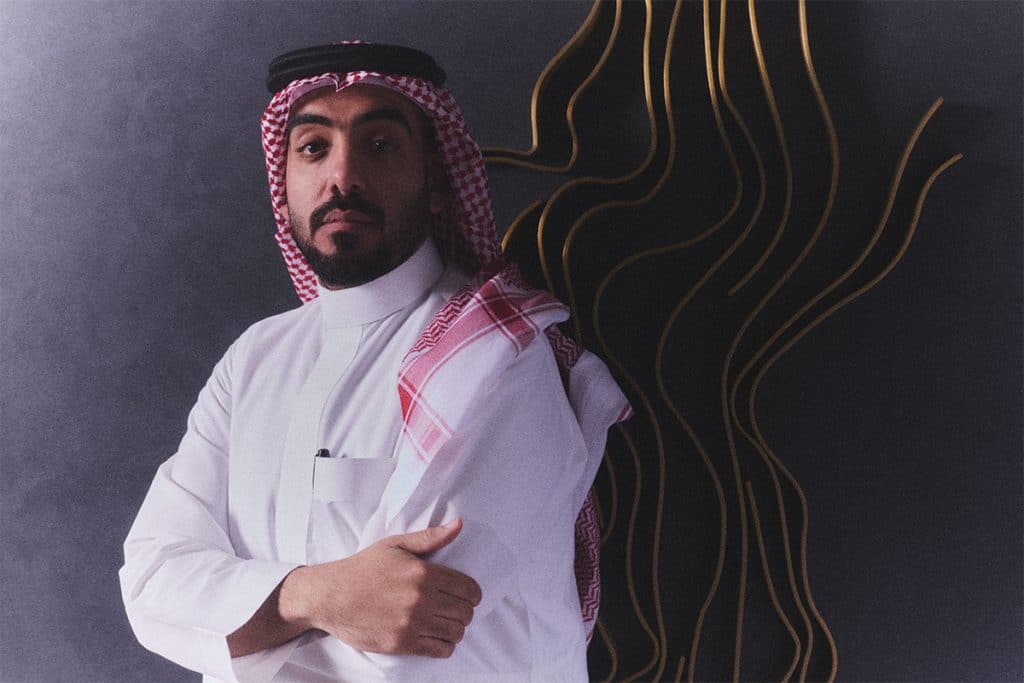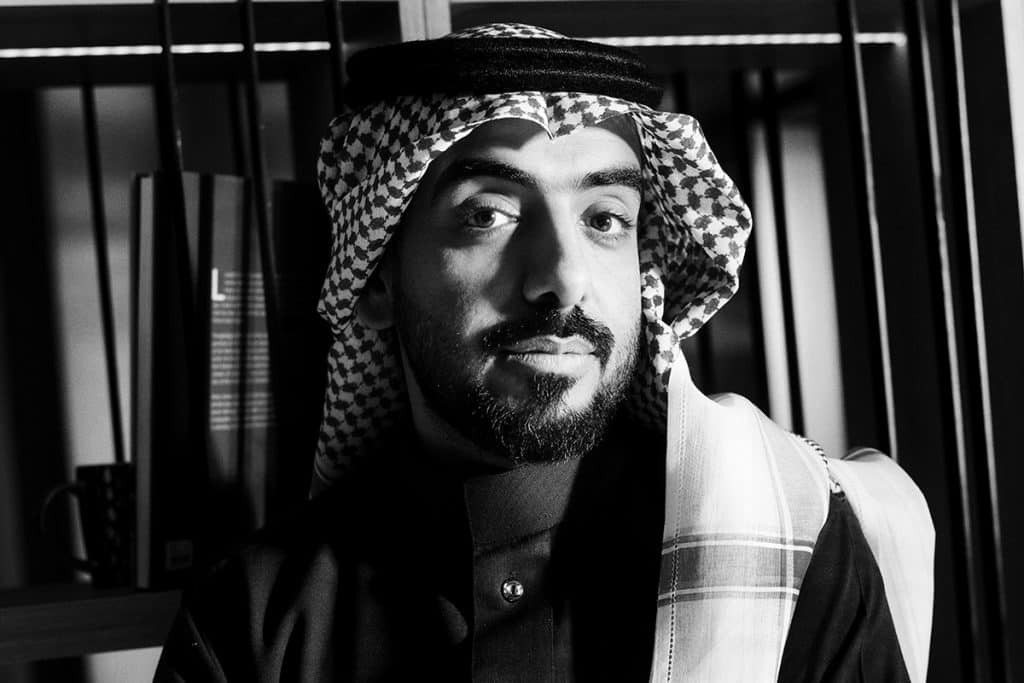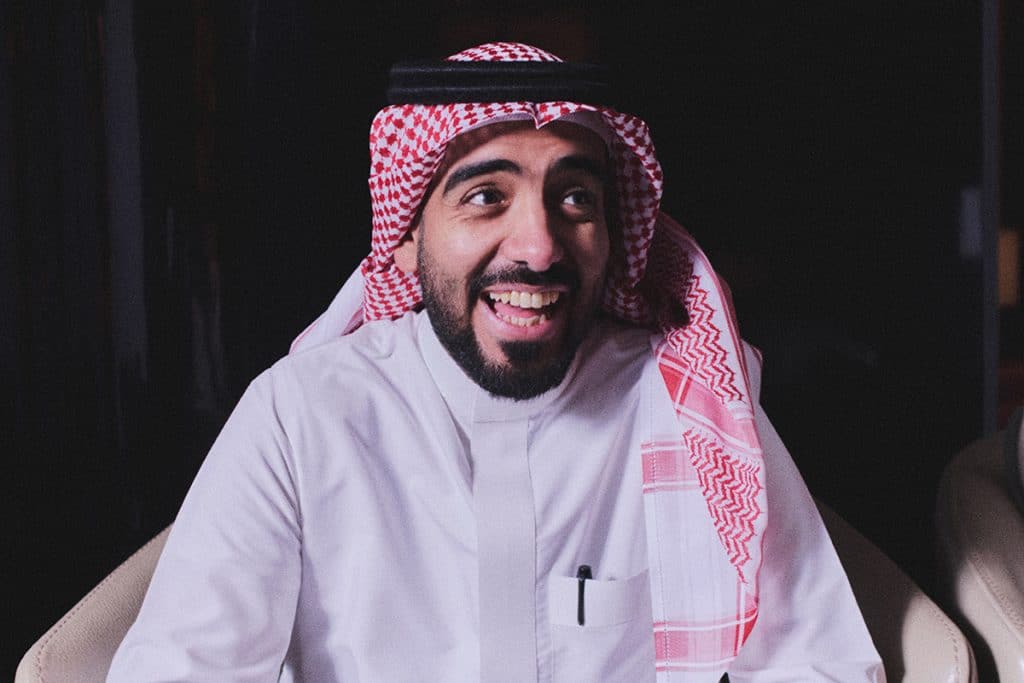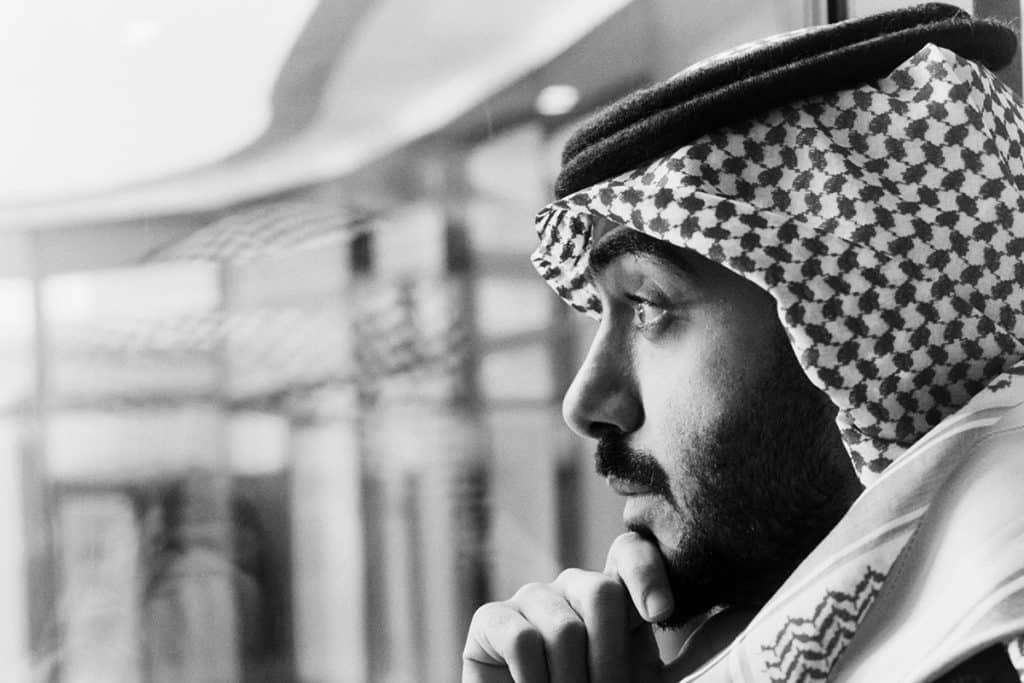For Turki Alfawzan, esports is deeply personal. “Electronic games changed my life,” he says. As a young gamer, he experienced first-hand the community and competition that esports offers. Now, as CEO of the Saudi Esports Federation (SEF), he’s channelling that passion into creating opportunities for others.
When Alfawzan takes the global stage, he isn’t just representing a nation – he’s embodying a vision. Alfawzan is orchestrating a transformation as intricate and high-stakes as the most competitive gaming matches. In just seven years, SEF has grown from a bold concept into a billion-dollar force, reshaping not just Saudi Arabia’s gaming scene but the global esports landscape. Under Alfawzan’s guidance, esports has shed its image as a niche hobby, emerging as a key pillar of Vision 2030 – a sweeping strategy to redefine the Kingdom’s future.
But does he still find time to play? “I miss Turki the player,” he admits with a smile.
“Balancing leadership and passion is a challenge.”
With $13 billion in projected GDP contributions, 39,000 jobs on the horizon, and a cultural movement spanning generations, Alfawzan isn’t just playing the game – he’s rewriting the rules.
“We’ve created an exceptional success story,” Alfawzan reflects, “but from today to 2030, we’re building something that will be taught in universities.”
Esports takes centre stage
In 2017, Saudi Arabia was launching Vision 2030, a national initiative to diversify the economy and reduce reliance on oil. At the same time, esports was beginning its meteoric rise. By then, global esports viewership had already surpassed football, drawing millions of fans worldwide to watch their favourite players battle in games like League of Legends and Counter-Strike. For Alfawzan, the Kingdom’s potential was clear.
“When we look at esports, by 2017 the number of participants had surpassed football viewership. The momentum, demand, and player base represented a billion-dollar sector experiencing massive growth,” Alfawzan recalls. However, he notes, “The main challenge facing this sector was that decision-makers always viewed this world as parallel rather than as a massive sector with growth potential and industry capabilities.”
Saudi players were already making waves internationally, but they lacked the infrastructure, recognition, and support to thrive. SEF was established to address this, turning scattered talent into an organised force and opening doors to opportunities that were previously out of reach.
Why esports? For Alfawzan, the answer lies in demographics. “Two-thirds of the Saudi population is under 30,” he explains. “This is their sport, their passion.”

A new vision for sport
Esports is more than just gaming – it’s about shaping the future. Under Alfawzan’s leadership, SEF has become an interconnection of technology, culture, and sport, bridging gaps and forging new connections in ways that would have been unthinkable a decade ago. Unlike traditional sports federations that focus on growing participation, SEF faces an entirely different challenge: meeting overwhelming demand.
“Every tournament we organise consistently reaches full capacity, leaving us striving to expand and accommodate more participants and spectators,” Alfawzan shares.
A defining moment came during the COVID-19 pandemic. As the world came to a standstill, SEF launched Gamers Without Borders, a groundbreaking global gaming initiative. The programme wasn’t just a diversion; it was a mission.
“We launched an initiative when everyone was at home and the general atmosphere was very negative,” Alfawzan recalls. “We came up with a content creation initiative called ‘Gamers Without Borders,’ a Saudi initiative for the whole world and all players globally, to stay connected and engage with them.” The initiative featured professional content and world champions while raising $10 million for charities combating COVID-19.
This ethos of innovation and purpose underpins SEF’s operations. Now recognised alongside football, swimming, and motorsports under the Saudi Olympic Committee, esports is taking its place as a fully-fledged sport.
Building a billion-dollar industry
Esports is often dismissed as entertainment, but Alfawzan sees it as a significant economic engine. By 2030, one of the Saudi Esports Federation’s key goals is to contribute $13 billion to the Saudi economy. “The goal of video games is to contribute to GDP,” Alfawzan explains. “And the goal isn’t just for the federation, but for the sector as a whole.”
To achieve this, SEF has laid the foundation for a thriving ecosystem that includes professional players, analysts, broadcasters, game developers, and designers. “Esports is an industry in itself, like football,” Alfawzan points out. “Today, professional players are contracted with their clubs with salaries, administrators are employed, there are team captains, and even at the federation level and tournament organisation, there are broadcasters, commentators, and analysts – all these are jobs in the esports sector.”
One of SEF’s flagship initiatives is the establishment of a $1.8 billion development fund in cooperation with the National Development Fund. “The goal of this development fund is stimulation through three tools; investment, loans, and support, all to support this segment,” Alfawzan explains. “One of their most important challenges is that lending in this sector is difficult, especially from banks.”
“If we talk about the video game sector, no one comprehends the size of this sector – it’s bigger than the film and music industries combined. It’s a huge billion-dollar sector,” Alfawzan states.

The rise of women in esports
One of the most remarkable aspects of Saudi Arabia’s esports revolution is the surge in female participation. Today, women comprise 48 per cent of the Kingdom’s gaming community, with professionalisation rates exceeding global averages. This progress is not incidental but the result of deliberate efforts to create a more inclusive gaming environment.
“This is the beauty of electronic games even before entering esports,” Alfawzan explains. “Electronic games are a reflection of demographics at any country level. You find the number of players reflects the population composition of the country.”
What sets Saudi Arabia apart is how it has transformed participation into leadership. Globally, female professional players make up only 8-12 per cent of the competitive scene. In Saudi Arabia, however, that figure surpasses 20 per cent. “We’re above 20 per cent of professional female players who have contracts and are part of clubs,” Alfawzan proudly shares.
Esports’ unique characteristics make it an ideal platform for inclusivity. It doesn’t rely on physical strength or infrastructure, removing many barriers that have historically excluded women from other competitive sports. Alfawzan highlights this point, “The advantage of esports is that it doesn’t contain physical contact, there’s no violence, it doesn’t need infrastructure, no specific time, and access is very easy for both males and females.”
The growth of female participation in Saudi esports aligns with Vision 2030’s broader mission of empowering women and fostering equality across all sectors. This shift is not merely symbolic; it’s reshaping perceptions within the Kingdom and beyond. Saudi female gamers are breaking stereotypes, competing internationally, and inspiring a new generation of women to pursue careers in gaming and technology.
Esports isn’t just allowing women to compete – it’s providing them with a platform to lead. Female gamers in Saudi Arabia are representing the Kingdom on the world stage. Their achievements are redefining the narrative around women in esports and demonstrating that gender is no barrier to excellence.
Cultural values in gaming
As Saudi Arabia’s esports industry expands, Alfawzan remains acutely aware of the need to balance growth with cultural preservation. While esports presents enormous opportunities, it also brings challenges that require careful navigation, especially in a society where traditional values hold deep significance. Games like PUBG, which feature voice chat and online interaction, have raised concerns among some segments of the population. For Alfawzan, the answer isn’t restriction but education and proactive engagement.
“Blocking isn’t the answer,” he says. “Instead, we focus on awareness and creating games that reflect our culture.”
SEF has taken significant steps to address these concerns, developing a framework that promotes responsible gaming while preserving cultural values. This includes collaborating with game developers to create titles that celebrate Saudi heritage and traditions. By embedding cultural narratives into gaming, SEF is transforming esports into a platform for storytelling. “The ambition is how to make a game that embodies our culture – and not just for our children, but for the whole world,” Alfawzan explains.

These efforts are part of a broader strategy to use esports as a tool for cultural diplomacy. Through gaming, Saudi Arabia is not just participating in the global esports industry – it’s leading with authenticity. “You have an opportunity to deliver your message in a simple way that speaks to this generation and is understood and accepted faster through video games,” Alfawzan says.
SEF’s approach goes beyond content creation. It actively promotes awareness and education about the potential risks associated with gaming, working closely with stakeholders to implement solutions like parental controls and community outreach programmes. These measures ensure that gaming evolves in a way that aligns with Saudi Arabia’s values while embracing the global nature of esports.
Alfawzan sees gaming as a powerful medium for cultural exchange and influence. By integrating Saudi identity into innovative game design, SEF is not only creating content but also shaping how the world perceives and engages with the Kingdom. “Transferring culture through a real industry in the way that suits you and you believe in – this is the supreme goal,” Alfawzan states.
Competing on the global stage
Saudi Arabia’s entry into the global esports arena may have come later than nations like Japan, the US, and Europe, but its ambitions are undeniable. Alfawzan views this as both a challenge and an opportunity. “Of course, this sector is mature, and there are companies worth billions of dollars in different markets,” he acknowledges. “America has reached advanced stages, in European countries, in Japan, in China – all these are players, and their industry is very developed.”
While acknowledging the steep competition, Alfawzan emphasises the Kingdom’s unique advantages. With its young, tech-savvy population and the backing of Vision 2030, Saudi Arabia is well-positioned to become a global leader in esports. “For Saudi Arabia, it’s natural that it would be a challenge, and it’s natural that it will take time,” he explains.
One of the key drivers of Saudi Arabia’s rapid ascent is its collaboration with SAVVY Gaming Group. “SAVVY is the leading national company at the sector level,” Alfawzan notes. The group’s investments, including the acquisition of major global esports companies, have accelerated the Kingdom’s progress. “This touches esports directly,” Alfawzan adds, highlighting the strategic importance of this partnership.
This passion is further exemplified by Saudi Arabia’s state-of-the-art infrastructure, including the Super Dome in Riyadh – the world’s largest esports arena. “We are in very advanced stages in electronic sports,” Alfawzan says. “For example, we talk about infrastructure in electronic sports, like the Super Dome arena, which is considered the largest arena in the world dedicated and equipped with high technologies to host the most important and biggest events.”
Despite these achievements, Alfawzan is clear-eyed about the challenges ahead. “The path to competitiveness won’t be easy,” he acknowledges. “It will be full of challenges, it will take time, and there will be failures during the journey completely.”
Infrastructure and technology
To compete on the global stage, a robust technological foundation is essential, and Saudi Arabia is making this a priority. “Today, everything is connected,” Alfawzan says. “All opportunities are in connection, the whole future is in connection.” He stresses the importance of server proximity and latency, critical factors in esports. “For example, one of the most important indicators in the world of games is response speed and your internet speed – not just depending on internet speed, but the server’s distance from you.”
Saudi Arabia is addressing these challenges by building a cutting-edge infrastructure. “Sometimes the ping is between 10 and 20, and this is excellent if the server is hosted in Saudi Arabia or in a geographical location close to you,” Alfawzan explains. “If you’re connecting to a distant server in Europe, for example, and the ping is above 100, many game manufacturers consider the game unplayable in this case.”

However, Alfawzan recognises that infrastructure is only part of the solution. “The matter is more complex than being this easy,” he admits. “This depends on all partners and all manufacturers in this matter. For example, Amazon depends on Amazon itself; a certain game wants to host it with Amazon in a certain region – this depends on them.”
Despite these complexities, Saudi Arabia remains committed to creating a supportive environment for all stakeholders. “Saudi Arabia’s mission is to provide an appropriate environment for all stakeholders in the decision-making process,” Alfawzan says. “The goal is to have the best infrastructure, but the decision isn’t yours alone.”
This technological foundation isn’t just about enhancing gameplay – it’s about positioning Saudi Arabia as a global leader in esports. “Today, your strength in all these matters will reflect on your presence,” Alfawzan asserts.
Looking ahead
As SEF prepares for the 2025 Olympic Esports Games, Turki Alfawzan’s goals remain as bold as ever. “Our aim is to host the Olympics, win gold medals, and show the world what Saudi Arabia is capable of,” he declares with conviction.
But Alfawzan’s vision extends far beyond medals and tournaments. Under his guidance, Saudi Arabia has evolved from an esports outsider to a global powerhouse, blending tradition, technology, and passion into a force that is redefining the boundaries of gaming and sport.
As the Kingdom’s gaming revolution continues to gather momentum, one truth stands out – Alfawzan isn’t just changing the game – he’s transforming the industry.









